RTÉ's Foreign Editor Eimear Lowe reports from Afghanistan, where she is visiting UNICEF's operations as aid agencies warn that the country is on a knife edge following the Taliban takeover last summer.
Suma says she is 50 but she looks around 75. Another one of Afghanistan's invisible women who, unlike us, don't fret about their age.
Suma lives with her daughter Amina and her eight-year-old granddaughter Rabia. Their village is in a rural part of Badghis province which is one of Afghanistan's poorest regions.
The view from Suma's door is stunning. A rugged mountain range looms over her village, its rock face changing colour in the sunlight, hinting at a rich mineral bounty underneath.
Suma is unfailingly polite and completely unfazed when we arrive at her door with a clamour of local men and boys. I am there with a UNICEF delegation who have come to inspect a solar-powered water pump the agency has installed in the village.
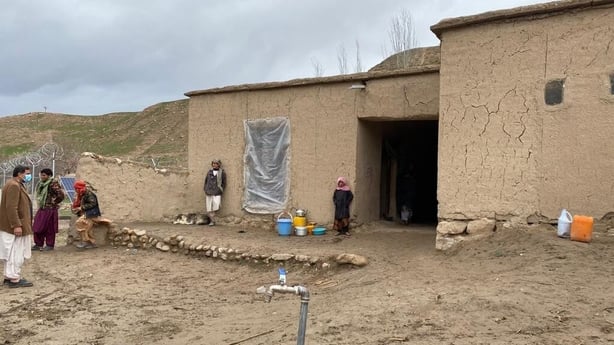
When we arrived, we were greeted by the village elders and swept up by a cluster of men to inspect the caged water pump, which is locked behind a chain-link fence. It takes me a few minutes to register that there are no women to be seen anywhere, but the village's male population is out in force.
One of the delegation wryly observes that the women are likely the biggest beneficiaries of the pump but it's the men who talk about it. Eventually though, myself and the other woman in our group, UNICEF's Communications Director in Afghanistan, Sam Mort, are invited to meet some women who can talk about how the pump and its network of taps have changed their lives.
We need your consent to load this rte-player contentWe use rte-player to manage extra content that can set cookies on your device and collect data about your activity. Please review their details and accept them to load the content.Manage Preferences
Before we are allowed to visit Suma, we are instructed to put away our phones and not try to take any photographs of the women. So, there we are, at her door, firing questions at her through an interpreter which she answers while trying to slip her bare feet into a pair of moccasins at the door.
To say that a simple tap has transformed her life would be an understatement. Before it was installed, she and other females in the village would traipse 200 metres to get water in the local river. They could do this up to 20 times a day, picking their way over the rocky riverbank in all weather.
Suma shows us her crooked wrist which she broke two years ago while collecting water. It was winter and she slipped and fell. Her wrist was never set properly and now a bony growth protrudes and she can no longer bend it.
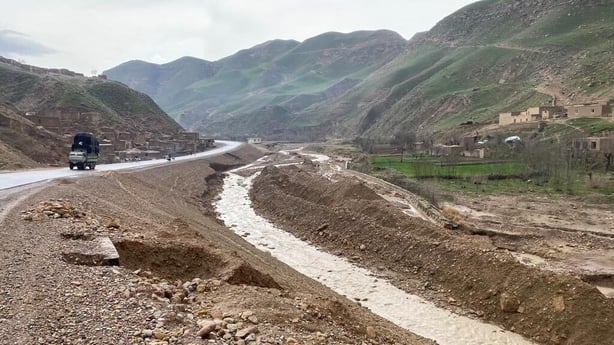
Suma rubs it absent-mindedly while telling us that the children's health has improved since the tap was installed and they stopped drinking the dirty river water.
At this point, Sam inquires if the men ever went to collect the water and Suma, matter of factly, responds that they haven't. At this point the men, who have crowded around the door laugh as Sam wags a chiding finger at them. But it's not a sheepish laugh, it's as if she has cracked a funny joke.
In fairness to the men in these parts, they work hard. As we travel further into Badghis, we see them working on the land. They have no tools and while the ground seems quite fertile and green, the earth is a rusty colored clay.
At one point in the journey, the road converges with a river which we have to cross. It's hard work even for the UN SUVs and several local men, armed with spades, seem to stay there all day helping cars negotiate the rushing waters.
Surviving on bread and tea
Anyway, back to Suma, who through this one conversation is painting a grim picture of her life and the lives of those around her. She tells us that she hasn't eaten meat in three months, surviving on bread and tea.
She worries about the fact that there is less food around and says there is no work for the men in the village. Some travel to neighbouring Iran but the currency there is very low so even if they do find work, life is still very hard.
She says they don't make rugs, which is a specialty in this area, and points out that even if she did, she couldn't sell them at the bazaar as no-one could buy them because of the sanctions imposed after the Taliban takeover.
As Suma patiently explains the harshness of her life, eight-year-old Rabia leans shyly on the doorpost and gazes at us with dark, watchful eyes. She tells us that she goes to the local school and that her favourite subject is maths. I give her a thumbs up, trying to show encouragement and she blushes.
We head back to our convoy and push further into Badghis. Like the stunning scenery, the poverty and hardship is relentless.
In the area's regional hospital, we meet a young mother, Selena, who had to ring her brother in Iran for the money she used to get her child there.
Her husband and three children all had measles but it was her youngest son, only six months old, who had it worse. When he arrived at hospital, staff also noticed that he was malnourished. It's a common story in this area, and UNICEF tell us, right across Afghanistan.
Later that day we visit the sprawling Zaimati camp for Internally Displaced People. We are greeted by girls who welcome their UNICEF benefactors with a song about the importance of peace.
Outside, the armed Taliban guards who have accompanied us on the trip for security, pretend not to notice the growing crowd of children staring at their guns. Most of them are clad in some form of US combat gear which was plundered last August after the Taliban swept across the country and the US troops swept out.
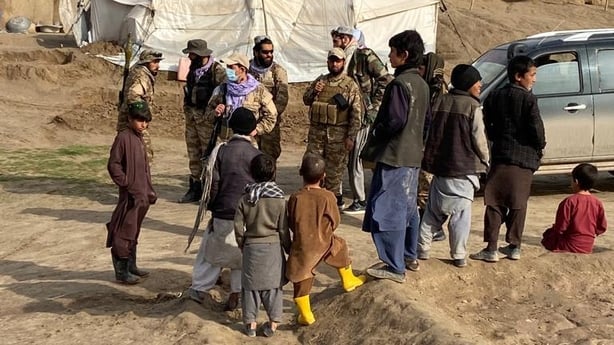
Child marriage is quite common
Aside from the UNICEF 'child friendly’ places, which are metal huts decorated with colourful posters, containing shelves with books and colouring pencils, there is nothing for children to do in this camp.
Some play in the dirt outside. One little girl skips using a scarf for a rope, others squat, gazing off into the middle distance. I wonder what sort of games these children play, they have no stimuli, no toys or games, no cartoon references.
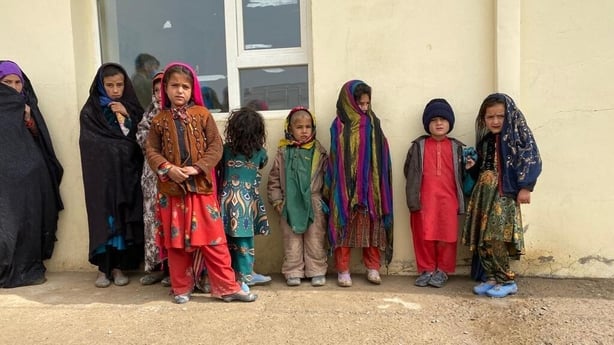
Sam tells me that we can go to visit the community childcare committee, which is meeting in a nearby tent. This committee, comprised of five women, has been instrumental in dissuading families from exchanging their children for marriage dowries.
It's a story of growing interest to Western media and I've asked Sam if she could find me a family to speak to. She can't but suggests the committee as an alternative. It's a good option.
The women are the sort that I have been looking for in my time here. They're chatty and opinionated and even better, there are no men around to tell us not to talk. They tell me that they were selected by the community and trained by War Child and UNICEF.
They explain that child marriage is quite common in the camp but that their interventions have been successful, and they estimate that they have halved the number of girls who are being sold into marriage.
They say that the girls are usually aged around ten. I've heard of even worse scenarios, where infants are exchanged for dowries but the committee seems fairly sure that the children being 'sold' are older.
I ask them what they say to the families who are selling their children and they tell me that all they do is explain that the practice is actually harmful to the child.
They say that they are trying the same technique with families who want to put their male children into work instead of sending them to school and point out that a lot of families will stop if the community step in to support them.
I've also heard anecdotal reports about people resorting to selling their own organs for money. Such is the need right now in Afghanistan that it seems people will do almost anything for money.
Our final stop is at a cash distribution initiative in the Moquir district of Badghis. When we arrive a queue of men has already formed. Several women, draped in shawls, crouch nearby.
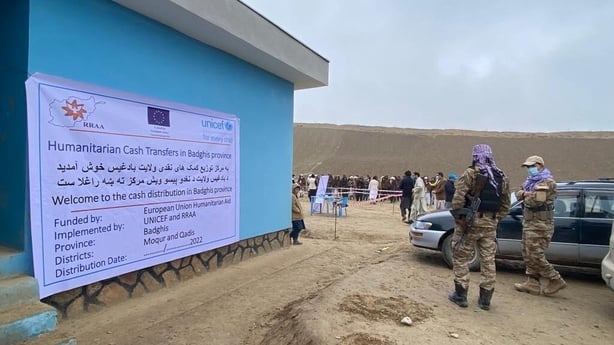
UNICEF are pleased with the project which, it has to be said, seems pretty well organised. It's being held in a remote area and everyone who attended has already been means tested.
When they first told me about it, I imagined crowds of desperate people fighting over wads of cash handed out by UNICEF volunteers. But the people receiving the money have already been vetted and the process is scrupulously organised.
People get the equivalent of $100 per month for three months. The rational is that they can choose how to spend their money, be it on food, rent, medicine, debts or warm clothes.
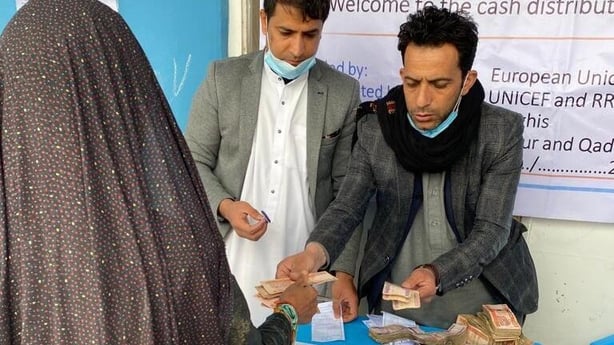
UNICEF say it's a dignified way to respond to an emergency crisis. The beauty is that it also helps the local economy as almost all the people we spoke to were heading straight to the market to buy food.
Because everyone here supports their extended families, there is a tremendous community spirit, the money benefits many more than those assembled.
It's controversial in aid agency communities especially those who subscribe to 'teach a man to fish', rather than 'give a man a fish' philosophy.
However, in this case there are no fish; they've been eaten long ago.




